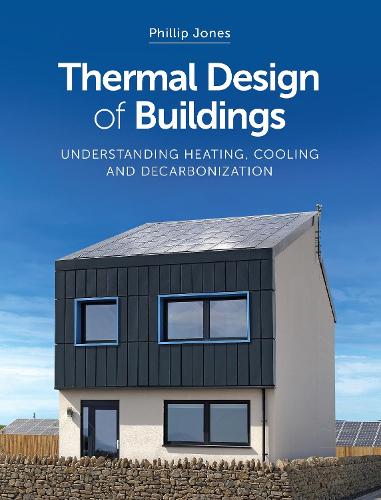
Thermal Design of Buildings: Understanding Heating, Cooling and Decarbonisation
(Paperback)
Publishing Details
Thermal Design of Buildings: Understanding Heating, Cooling and Decarbonisation
By (Author) Phillip Jones
The Crowood Press Ltd
The Crowood Press Ltd
26th July 2021
United Kingdom
Classifications
General
Non Fiction
697
Physical Properties
Paperback
240
Width 189mm, Height 246mm, Spine 17mm
663g
Description
The way we heat, cool and ventilate our buildings is central to many of today's concerns, including providing comfortable, healthy and productive environments, using energy and materials efficiently, and reducing greenhouse gas emissions. As we drive towards a zero-carbon society, design solutions that combine architecture, engineering and the needs of the individual are increasingly being sought. Thermal Design of Buildings aims to provide an understanding from which such solutions can be developed, placing technological developments within the context of a wider world view of the built environment and energy systems, and an historical perspective of how buildings have responded to climate and sustainable development. AUTHOR: Phillip Jones OBE is Emeritus Professor of Architectural Science at the Welsh School of Architecture, Cardiff University. For over forty years he carried out research, teaching and design in building environmental design and energy efficiency fields. He practices through Zenergy Design Ltd and Jones Kopitsis AG. He chairs the Welsh Government's Building Regulation Advisory Committee and Community Interest Company, Warm Wales. In 2020 he was awarded an OBE for services to Architecture and Decarbonisation. SELLING POINTS: . The way we heat, cool and ventilate our buildings is central to many of today's concerns . This informative book aims to provide an understanding from which such design solutions can be developed . Will be of great interest to architects interested in sustainability and the built environment . Case studies and research examples are used within the book supported by around 300 colour illustrations 105 colour illustrations, 190 figures
Reviews
Thermal Design of Buildings gives a holistic understanding of why and how net zero building design can and should be realised. The book is to be applauded for providing a useful, insightful and clear approach to thermal design and energy demand reduction. I certainly will be recommending it to my students as a useful resource. -- Jenny Crawley reviewer Buildings & Cities Journal * Buildings & Cities Journal *
this is a great book, densely packed with energy-related wisdom, with the perspective of a practitioner of 40 years with much of that history being faithfully reported and commented on. There are occasional surprises (for example, there are more cold-related deaths in Australia than in Norway; ironing clothes uses more energy per year than making cups of tea no contest!). This book is a must for any students reading list students of all ages. -- Pat Borer, The journal for architecture in Wales * The journal for architecture in Wales *
Author Bio
Phillip Jones OBE is Emeritus Professor of Architectural Science at the Welsh School of Architecture, Cardiff University. For over forty years he carried out research, teaching and design in building environmental design and energy efficiency fields. He practices through Zenergy Design Ltd and Jones Kopitsis AG. He chairs the Welsh Governments Building Regulation Advisory Committee and Community Interest Company, Warm Wales. In 2020 he was awarded an OBE for services to Architecture and Decarbonisation.
